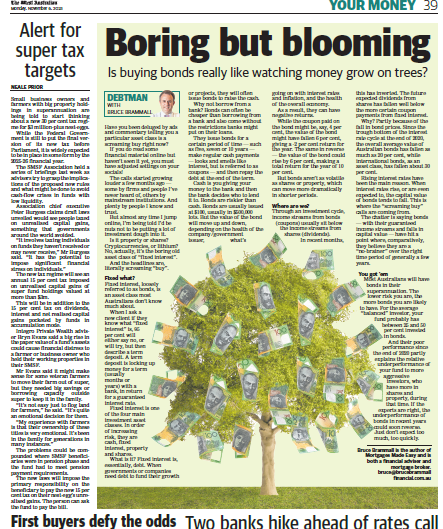
Bruce Brammall, The West Australian, 6 November, 2023
Have you been deluged by ads and commentary telling you a particular asset class is a screaming buy right now?
If you do read some financial material online, and haven’t … you must have adjusted settings on your socials!
The calls started getting louder a few months ago. Some by firms and people I’ve never heard of. Others by mainstream institutions. And plenty by people I know and trust.
But almost anytime I jump online, I’m being told I’d be nuts not to be putting a lot of investment dough into it.
Is it property or shares? Cryptocurrencies, or lithium? No, actually, it’s the boring old asset class of “fixed interest”.
And the headlines are, literally, “screaming buy”.
Fixed what?
Fixed interest, loosely referred to as bonds, is an asset class most Australians don’t know much about.
When I ask a new client if they know what “fixed interest” is, 95 per cent will either say no, or will try, but then describe a term deposit (TD). A TD is locking up money for a term (usually months or years) with a bank, in return for a guaranteed interest rate.
Fixed interest is one of the four main investment asset classes. In order of increasing risk, they are cash, fixed interest, property and shares.
What is it? Fixed interest is, essentially, debt. When governments or companies need debt to fund their growth or projects, they will often issue bonds to raise the cash.
Why not borrow from a bank? Bonds can often be cheaper than borrowing from a bank and also come without the restrictions banks might put on their loans.
They issue bonds for a certain period of time, such as five, seven or ten years, make regular cash payments (looks and smells like interest, but is referred to as coupons) and then repay the debt at the end of the term.
Cash is you giving your money to the bank and then the bank decides who to lend it to. Bonds are riskier than cash.
Bonds are usually issued at $100 (usually in $500,000 lots). But the value of the bond will move up and down, depending on the health of the company/government issuer, what’s going on with interest rates and inflation, and the health of the overall economy.
As a result, they can have negative returns.
While the coupon paid on the bond might be, say, 4 per cent, the value of the bond might have fallen 6 per cent, giving a -2 per cent return for the year. The same in reverse, the value of the bond could rise by 6 per cent, making a total return for the year of 10 per cent.
But bonds aren’t as volatile as share or property, which can move more dramatically in shorter periods.
Where are we?
Through an investment cycle, income streams from bonds (coupons) usually sit below the income streams from shares (dividends).
In recent months, this has inverted. The future expected dividends from shares has fallen well below the more certain coupon payments from fixed interest.
Why? Partly because of the fall in bond prices. Since the trough bottom of the interest rate cycle at the end of 2020, the overall average value of Australian bonds has fallen as much as 20 per cent, while international bonds, as an asset class, has fallen around 30 per cent.
Rising interest rates have been the main reason. When interest rates rise, or are even expected to, the capital value of bonds tends to fall.
This is where the “screaming buy” calls are coming from.
The chatter is saying bonds, with their guaranteed income streams and falls in capital value, have hit a point where, comparatively, they believe they are a “no-brainer” over the right time period, of generally a few years.
You got ’em
Most Australians will have bonds in their superannuation. The lower risk you are, the more bonds you are likely to have. For the average “balanced” investor, your fund probably has between 25 and 50 per cent invested in bonds.
And their poor performance since the end of 2020 partly explains the relative underperformance of your fund to more aggressive investors, who have more in shares and property, during that time.
If the experts are right, the underperformance of bonds in recent years could soon reverse. Just don’t expect too much, too quickly.
Bruce Brammall is the author of Mortgages Made Easy and is both a financial adviser and mortgage broker. E: bruce@brucebrammallfinancial.com.au.
